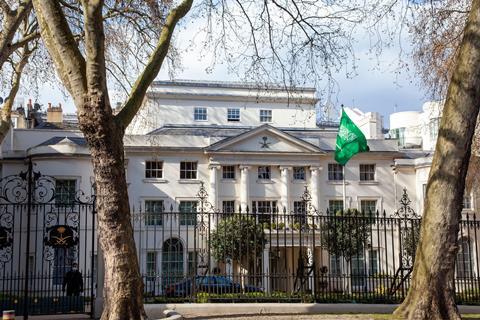The Supreme Court has found the Saudi embassy does not have state immunity from an employment tribunal claim under the State Immunity Act 1978.
The case in The Royal Embassy of Saudi Arabia (Cultural Bureau) v Costantine centres on Antoinette Costantine, a former employee of the Royal Embassy of Saudi Arabia who started her employment as a post room clerk before she was transferred to a secretary role.
In 2018, Costantine brought an employment tribunal claim complaining of direct discrimination on the grounds of religious belief and harassment related to religious belief. The Embassy pleaded immunity under the State Immunity Act 1978.
An employment judge found Constantine’s employment was not an exercise of sovereign authority and state immunity did not apply. The Employment Appeal Tribunal and Court of Appeal dismissed appeals.

Read more
In the Supreme Court judgment, Lord Lloyd-Jones, with whom Lord Briggs, Lord Hamblen, Lord Leggatt and Lord Burnett, agreed, said the employment judge had directed herself correctly as to the applicable law and made ‘detailed findings of fact’ in relation to Costantine’s employment.
He added: ‘Furthermore, on a fair reading of the judgment of the Employment Tribunal, I am unable to detect any error of law in the judge’s application of the law to the facts as she found them.’
Considering the Court of Appeal hearing, the Supreme Court said though the embassy’s failure to appear before the court was ‘regrettable and resulted in a waste of that court’s time…the Court of Appeal was not entitled simply to dismiss the appeal, as it did, without first considering of its own motion whether the appellant was entitled to state immunity’.
Lord Lloyd-Jones added: ‘The Court of Appeal was properly seised of the issue of immunity. That court was, therefore, aware of the precise issues of state immunity raised by the appeal.’
The CoA’s failure to ‘give proper consideration’ to the issue was an ‘error of law’. But, dismissing the appeal, Lord Lloyd-Jones said: ‘However, if it had addressed this issue it would necessarily have concluded that the appellant was not entitled to immunity.’
This article is now closed for comment.



























1 Reader's comment